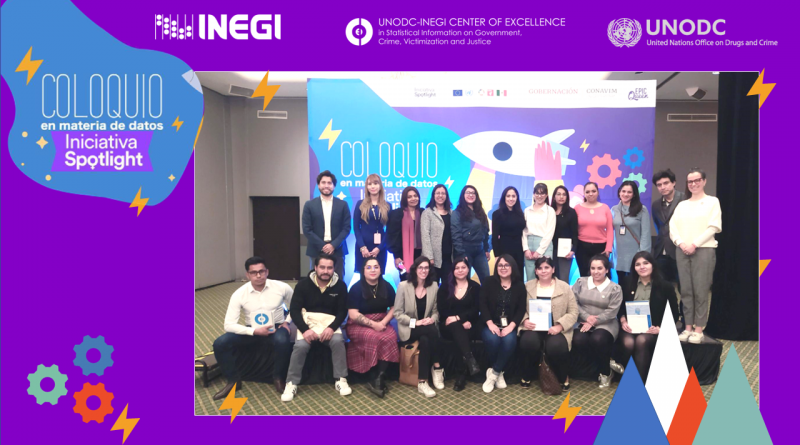The Center of Excellence fosters the incorporation of the gender perspective in crime and criminal justice statistics
Mexico City, Mexico. The Spotlight Initiative Data Colloquium took place on February 13 and 14. This face-to-face event, which was held in Mexico City, had the participation of the UNODC-INEGI Center of Excellence (CoE), which conducted the working session on the Gender Perspective in Statistics on Crime and Criminal Justice.
More than fifteen people from the states of Chihuahua, Mexico City, Mexico State and the federal level attended the working session representing institutions such as the National Data and Information Bank on Cases of Violence against Women, the Center for Studies for the Construction of Citizenship and Security, the Attorney General’s Office of the State of Mexico, the State and Municipal Women’s Institutes, the State Women’s Secretariat, the State and Federal Secretariats of Security, academia and civil society organizations.
To begin, the CoE explained the need to incorporate the gender perspective into crime and criminal justice statistics. It presented the statistical tools that have been developed to integrate it, such as the International Classification of Crime for Statistical Purposes and the Crime Victimization Survey Initiative in Latin America and the Caribbean. Subsequently, the gender perspective in criminal acts was discussed in depth, based on the indicators of the 2030 Sustainable Development Goals.
To enrich the topics presented, Ms. Paulina Grobet Vallarta, Coordinator of the UN Women Global Centre of Excellence on Gender Statistics, spoke about the Statistical framework for measuring the gender-related killing of women and girls (also referred to as “femicide/feminicide”) developed jointly with UNODC through the UNODC-INEGI CoE. She indicated that it is a tool aimed at providing a statistical definition of gender-related homicides of women and girls that serves to adequately identify the data and statistics that account for this type of act.
On the second day of the event, Ms. Eloina Meneses Mendoza, Director of Governmental Information Development of the National Institute of Statistics and Geography (INEGI) presented the surveys conducted by the institute that reveal the extent to which women in Mexico experience different types of violence. She described the compendium of INEGI’s statistical products that make violence against women in Mexico visible, its main results, as well as its methodological aspects. To close, the CoE pointed out aspects of the gender perspective in the Criminal Justice System, the challenges for its incorporation and possible solutions based on the data.
The working session also allowed participants to learn about how other participating institutions incorporate the gender perspective in their data systems, as well as the challenges they face in producing, compiling and disseminating data. Although they found some processes with substantial differences, they agreed that they have similar problems such as the lack of standardization in the capture of information, the need for staff to be trained in the gender perspective, and the negative impact of staff rotation.
The working session closed with a group reflection on the usefulness of the information provided, as well as the key actions for the successful incorporation of the gender perspective in the production of statistics for decision-making in public policies that favor the prevention, attention, punishment and eradication of gender-based violence, especially violence against women, girls and adolescents.
This workshop was based on the contents of the online course: Gender Perspective in Crime and Criminal Justice Statistics given by the CoE. For more information on this course, visit: Curso en línea: Perspectiva de género en las estadísticas de delincuencia y justicia penal



